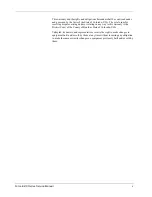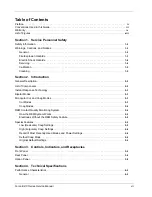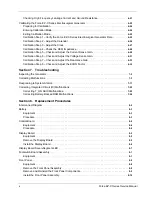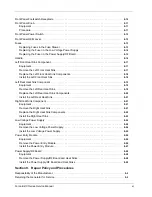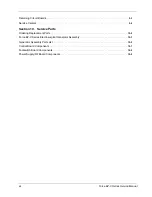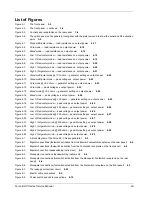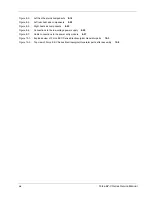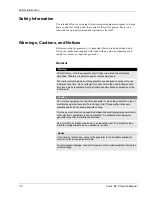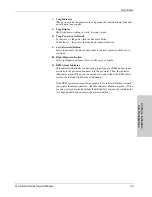
Warnings, Cautions, and Notices
Service Personnel Safe
ty
Force EZ-C Service Manual
1-5
Calibration
Cleaning
Caution
To avoid inadvertent coupling and/or shunting of RF currents around the resistor
elements, keep the resistors at least 10.2 cm (4 in.) away from any metal surface
including tabletops and other resistors. This is especially true if several resistors
are connected in series or parallel to obtain a specified value. Do not allow the
resistor bodies to touch each other.
Notice
After completing any calibration step, proceed to the next step to save the values
from the completed calibration step.
Do not activate the generator with any load resistor higher than 10 ohms while
calibrating the current sense gain. Otherwise, product damage will result.
Do not activate the generator with any load resistor lower than 750 ohms while
calibrating the voltage sense gain for bipolar output. Otherwise, product damage
will result.
Do not activate the generator with any load resistor lower than 3000 ohms while
calibrating the voltage sense gain for the pure cut mode. Otherwise, product
damage will result.
Do not activate the generator with any load resistor lower than 2000 ohms while
calibrating the voltage sense gain for the blend mode. Otherwise, product
damage will result.
After calibration, the generator will be ready to use only after you initiate the
internal self-test by turning the generator off, then on.
Calibrate the generator after you install a new battery. All data stored in internal
memory, including calibration constants, is lost when the battery is replaced.
Calibrate the generator after you install a new Control board. Otherwise it uses
default calibration values.
Calibrate the generator after you install a new heat sink or replace components
on the heat sink. Component differences may affect output waveforms.
Calibrate the generator after you install a new Power Supply/RF board.
Component differences may affect output waveforms.
Notice
Do not clean the generator with abrasive cleaning or disinfectant compounds,
solvents, or other materials that could scratch the panels or damage the
generator.

